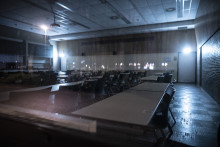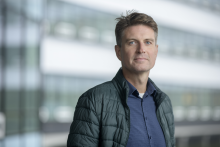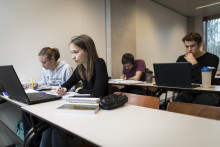Frank Bode is a Maintenance and Real Estate manager in the Campus & Facility Management department, and responsible for safety and continuity on campus. Power outages do not worry him much: 'There are few places where things are as well-organised as at UT. An emergency plan starts up immediately, to keep all critical processes up and running, especially around the laboratories and data centres. The emergency generators kick in and they can continue for four hours if necessary. If the outage is not solved in the meantime, there is a can of diesel ready to refill them.'
Bode explains that the UT has full control of the power grid on campus. 'We are our own network supplier. This way we control everything here, and we can maintain the level of maintenance that a technical university needs. Of course, we have no control over what happens outside of it.'
Critical processes safe
At the Nanolab, they aren’t worried either. Rob Legtenberg, director of the Nanolab, clicks on his screen a few times, and an emergency plan pops up in no time. 'We ensure that the essential processes continue to run. The air treatment, emergency cooling, oil vapor extraction, the fire detector, those kinds of systems. So research isn’t jeopardised.'
No coffee
But the UT's network and all communication also run on electricity. According to Henk Swaters, head of the LISA digital security service, a few things will change as soon as they go down. ‘All generators will automatically switch on, and we seamlessly will continue on emergency power. You won't notice the switch itself. Our data centres will then proceed as usual. We will however temporarily lose the network, as we are shutting down less important processes to reduce the load on the generators. Unfortunately, the coffee machines are down, so you might want to work from home for a while,' he says matter-of-factly.
Locks on buildings are also partly electronic. But they will be fine, according to Bode: 'They have an independent power supply. In any case, all doors of the so-called 'outer shell', the entrance doors of every building, are usually open.'
Another inconvenience is that the lift will come to a standstill. Even while there still might be people inside. 'But they can contact the switchboard through the independent lift telephone. It will involve the fire brigade, but that's not very serious either.'
In the dark
To ensure that everything is in tip-top order, Swaters and his team check all emergency facilities twice a year. They also do a so-called 'in-the-dark' test twice a year, to practice the switch from regular to emergency power, and to check whether everything is functioning properly. 'Fortunately, there have been no incidents in recent years.'






